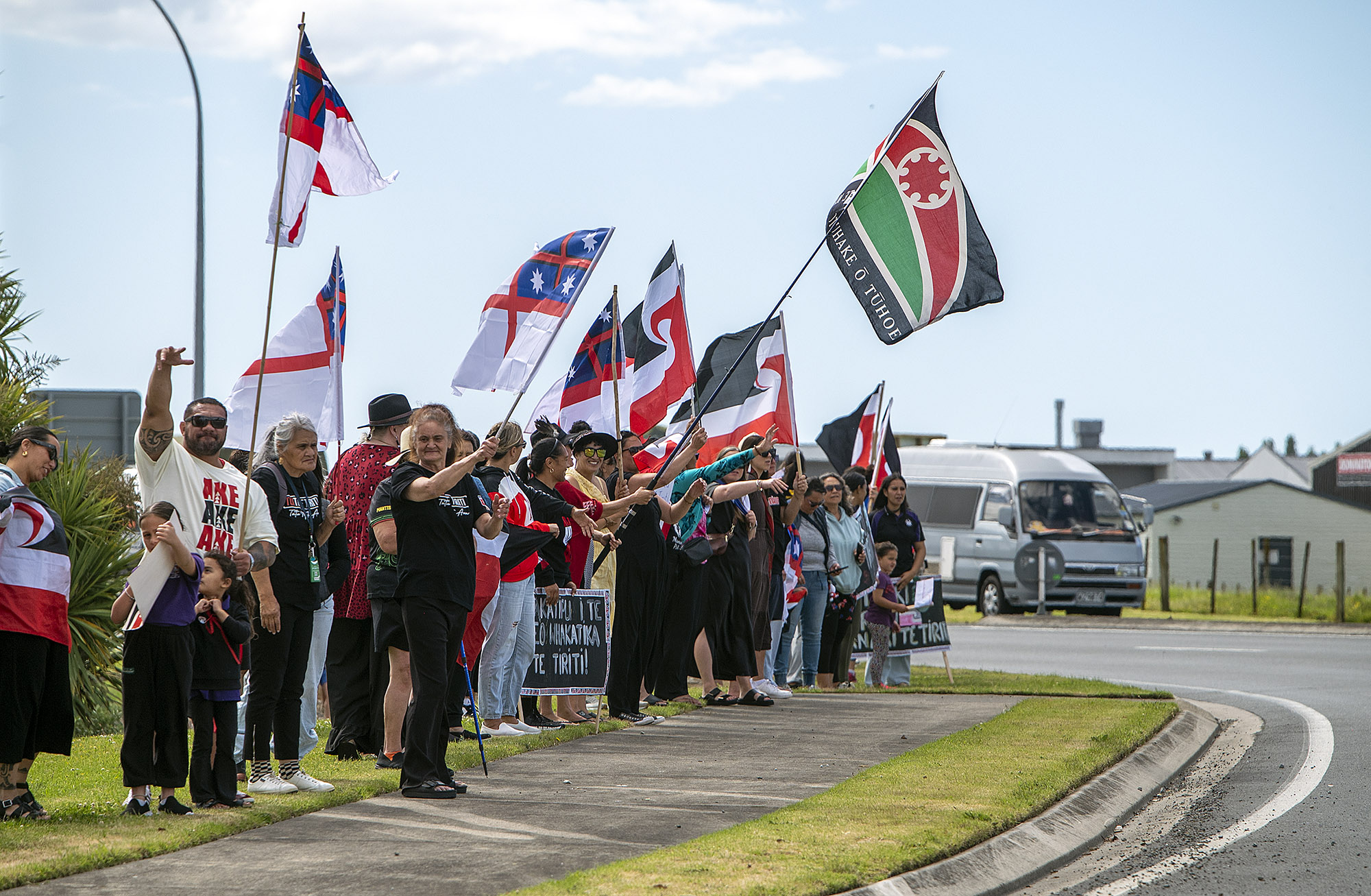On peace, pragmatism and smart-arse politicians

Contributed
Toi Iti
Intuitively, we know we shouldn’t trust politicians. Seriously, what kind of person goes around broadcasting that they have all the answers to society’s woes? They’re that smart-arse kid in class whose hand always shoots up first and looks far too smug whenever they get the answer right. We know them. We don’t like them.
OK, perhaps that's painting politicians with a broad brush. But it's definitely the vibe David Seymour gives. He is so that kid.
Now, all grown up and soon-to-be Deputy Prime Minister, Seymour still looks ridiculously smug for someone whose bill just died an inevitable, drawn-out, and expensive death.
It will undoubtedly be recorded as more historic than John Key’s vanity project. Tens of thousands of people didn’t march into Wellington to protect the Union Jack on our bunting. Nor did Key’s flag debacle trigger a submission tsunami—flooding the select committee, drowning its poor officials, and leaving the democratic process gasping for air. Seymour’s bill probably cost a bit less too, though no doubt still in the millions.
Taxpayers' money aside, the cost we’re paying in community division is steep. Sure, there's not much argy-bargy in the supermarket aisles yet. But take a peek into the comment sections of ACT or Hobson’s Pledge Facebook pages. You’ll find an echo chamber of locked profiles repeating half-cooked talking points, scraped from some dank corner of the interwebs.
Embarrassingly, and much to my kids' non-amusement, you'll often find me in the frontline of those comment trenches, hopelessly outnumbered and obscenely outgunned. I deploy fact bombs impotently against impenetrable bunkers built of false equivalence, strawman arguments, and wilful ignorance.
It’s one of my more fruitless pastimes.
Perhaps even more so than leading Eastern Bay engagements on Te Mana o Te Wai, which has since been repealed, or contributing to council processes that arguably sunk millions of ratepayer dollars into a raft of policies and planning documents that won’t survive the imminent raft of reforms.
Though my frustration can be palpable at times, I don’t blame the info-poor. Post-Covid, the avalanche of bad-actor platforms masquerading as serious alternatives to legacy media has buried any sense of footing for your everyday punter. How the hell can they orient themselves when they're caught in a whiteout of manufactured controversies, misleading narratives and whataboutisms?
My own mother has been captured—posting on her page that 'there’s no way a stone-age culture, busy killing each other, could've signed a treaty.' And 'what about the Waitaha or the Moriori or the pre-Māori Celts?' Facts are facts are facts, as far as she’s concerned. To be blunt, my dear mum simply doesn't have the tools to navigate the muddy waters of pseudo-history, post-colonial constructs and politically motivated disinformation.
In this age of information, misinformation, and disinformation overload, we pick and choose what we believe.
At 73, Mum has chosen to believe people she doesn’t know, who have vested interests she can’t see, because they paint a picture confirming a bias she doesn’t even realise she holds. For now, she has chosen this over maintaining a healthy relationship with her sons and grandchildren. This is the price we pay.
And if I, an overly articulate Bay of Plenty Regional Councillor, cannot convince my own mother to step away from the keyboard and to choose whānau over pseudo-facts, then what hope do I have of influencing anyone else?
How could I convince you, dear reader, that the wellbeing of Māori is inseparable from the wellbeing of us all? Or that despite the rhetoric to the contrary, Māori language and culture holds hidden treasures that offer compelling ways to relate to the natural world, and to govern ourselves?
How could I convince you, dear neighbour, that Seymour, Brash and co. are following a global playbook specifically designed to limit indigenous peoples' ability to interfere with privatisation and resource extraction? Or that their deliberate twisting and distortion of words like 'woke' and 'equality' is part of that predatory playbook?
In truth, there is no hope. Heoi, I will not try to convince you.
Engari, I will appeal to your pragmatism.
Māori are not going anywhere. Ever. Accept it.
To suggest that my father, Tāme Iti, should submit to a world as dictated by Don Brash is as futile as telling an Irishman he’s a Pom, or the Vietnamese they’re French. It’s silly.
What you saw descend on Wellington at the Bill’s first reading, was 50,000-plus Tāme Itis. Dozens more are being born. Every. Single. Day.
We can save time, money, and heartbreak by looking up from our screens, clearing our heads, and resist being manipulated into moral panic and division. It is in our collective best interests to sit down and to engage courageously with respectful, thoughtful, considered dialogue. Together, on this whenua, we can grow and build healthy communities that are educated in their rich, diverse, culture and heritage, as well as their collective civic duties.
When the referendum for Māori wards comes up in October, the pragmatic way forward is guaranteeing Māori a seat at the table. Simple. It excludes no one, offers fair and rational equity rather than distorted notions of equality, and it moves us in the direction of reconciliation and peace.
As Trump’s trade wars rage around us, it is clear. Peace is productive. Peace is profitable. Peace is good for business.
I’ll soften a bit on my opening. There’s nothing inherently wrong with a smart-arse kid who thinks they’ve got all the answers. They often have talent, smarts and ambition. But when they repeatedly demonstrate a lack of empathy, it’s neither pragmatic nor wise to entrust them with the power to shape our perceptions of each other, our communities, or our shared future.
PLEASE NOTE: In the crafting this op-ed, the writer does not assert that all Māori are angels or that all Pākehā are devils. They do however make the assumption that you can read. Kia ora.